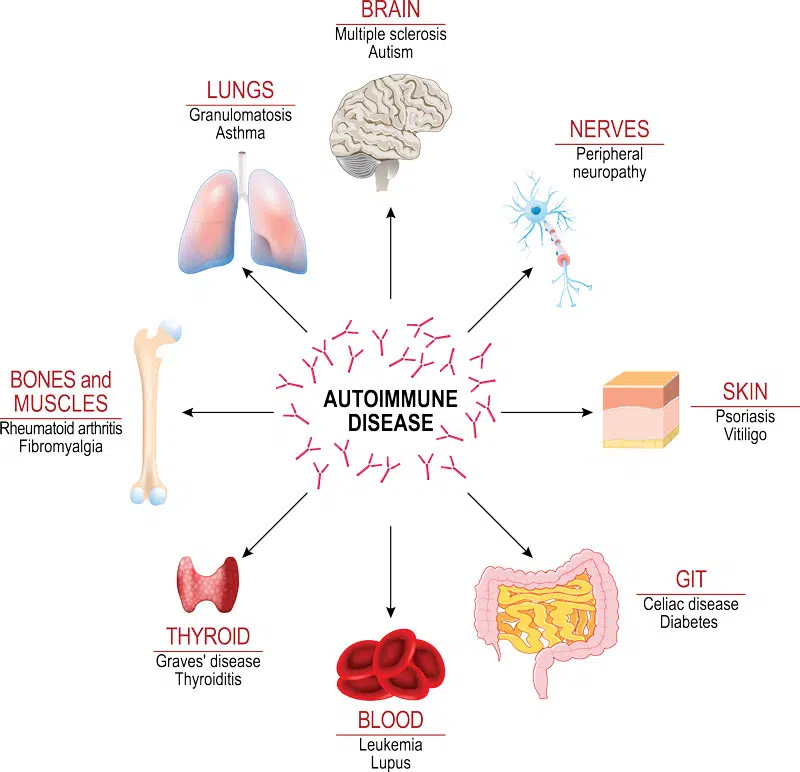Autoimmune Diseases
Calm the overactive immune response, bring down the inflammation and lifestyle choices to help you feel better.
Autoimmune disease affects around 5% of people and are one of the most important chronic health problems in Australia.
What is Autoimmune Disease?
Immune system disorders cause abnormally low activity or over activity of the immune system. In cases of immune system overactivity, the body attacks and damages its own tissues (autoimmune diseases). Immune deficiency diseases decrease the body’s ability to fight invaders, causing vulnerability to infections. In response to an unknown trigger, the immune system may begin producing antibodies that instead of fighting infections, attack the body’s own tissues
· Localised (organ specific) autoimmune diseases mainly affect a single organ and/or tissue. However, the effects frequently extend to other body systems and organs.
· Systemic autoimmune diseases can affect many body organs and tissues at the same time. They can be broadly classified into rheumatological disease and vasculitis disorders (inflammation of blood vessels).
How are autoimmune diseases diagnosed?
Autoimmune diseases are usually diagnosed using a combination of clinical history, blood tests (autoantibodies, inflammation, organ function) and other investigations such as x-rays. Sometimes a biopsy of affected tissues may be required for diagnosis.
Autoimmune disease examples
Rheumatoid arthritis.
The immune system produces antibodies that attach to the linings of joints. Immune system cells then attack the joints, causing inflammation, swelling, and pain. If untreated, rheumatoid arthritis causes gradually causes permanent joint damage.
Systemic lupus erythematosus (lupus).
People with lupus develop autoimmune antibodies that can attach to tissues throughout the body. The joints, lungs, blood cells, nerves, and kidneys are commonly affected in lupus.
Inflammatory bowel disease (IBD).
The immune system attacks the lining of the intestines, causing episodes of diarrhea, rectal bleeding, urgent bowel movements, abdominal pain, fever, and weight loss. Ulcerative colitis and Crohn’s disease are the two major forms of IBD.
Multiple sclerosis (MS).
The immune system attacks nerve cells, causing symptoms that can include pain, blindness, weakness, poor coordination, and muscle spasms.
Type 1 diabetes mellitus.
Immune system antibodies attack and destroy insulin-producing cells in the pancreas. At diagnosis, people with type 1 diabetes require insulin injections to survive.
Guillain-Barre syndrome.
The immune system attacks the nerves controlling muscles in the legs and sometimes the arms and upper body. Weakness results, which can sometimes be severe.
Chronic inflammatory demyelinating polyneuropathy.
Similar to Guillain-Barre, the immune system also attacks the nerves in CIDP, but symptoms last much longer. About 30% of patients can become confined to a wheelchair if not diagnosed and treated early.
Psoriasis.
In psoriasis, immune system blood cells called T-cells collect in the skin. The immune system activity stimulates skin cells to reproduce rapidly, producing silvery, scaly plaques on the skin.
Graves' disease.
The immune system produces antibodies that stimulate the thyroid gland to release excess amounts of thyroid hormone into the blood (hyperthyroidism). Symptoms of Graves’ disease can include bulging eyes as well as weight loss, nervousness, irritability, rapid heart rate, weakness, and brittle hair.
Hashimoto's thyroiditis.
Antibodies produced by the immune system attack the thyroid gland, slowly destroying the cells that produce thyroid hormone. Low levels of thyroid hormone develop (hypothyroidism), usually over months to years.
Myasthenia gravis.
Antibodies bind to nerves and make them unable to stimulate muscles properly. Weakness that gets worse with activity is the main symptom of myasthenia gravis.
Vasculitis.
The immune system attacks and damages blood vessels in this group of autoimmune diseases. Vasculitis can affect any organ, so symptoms vary widely and can occur almost anywhere in the body.
References
- What are Immune Disorders by Matthew Hoffman, MD – medically reviewed by Jennifer Robinson, MD on June 22, 2020
- https://www.allergy.org.au/patients/fast-facts/autoimmune-diseases




